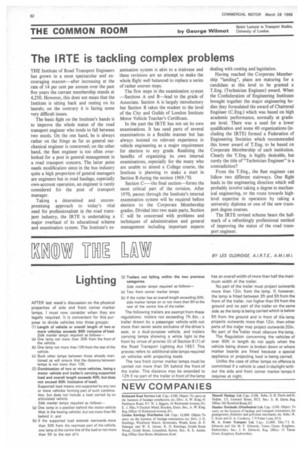The IRTE is tackling complex problems
Page 64

If you've noticed an error in this article please click here to report it so we can fix it.
THE Institute of Road Transport Engineers has grown in a most spectacular and encouraging manner—after increasing at the rate of 14 per cent per annum over the past five years the current membership stands at 4,250. However, this does not mean that the Institute is sitting back and resting on its laurels; on the contrary it is facing some very difficult issues.
The basic fight on the Institute's hands is to improve the whole status of the road transport engineer who tends to fall between two stools. On the one hand, he is always rather on the fringe as far as general mechanical engineer is concerned; on the other hand, the fleet engineer is too often overlooked for a post in general management in a road transport concern. The latter point needs modification since in the bus industry quite a high proportion of general managers are engineers but in road haulage, especially own-account operation, an engineer is rarely considered for the post of transport manager.
Taking a determined and uncompromising approach to today's vital need for professionalism in the road transport industry, the IRTE is undertaking a major overhaul of its educational scheme and examination system. The Institute's ex
amination system is akin to a staircase and these revisions are an attempt to make the whole flight well balanced to replace a series of rather uneven steps.
The first steps in the examination system —Sections A and B—lead to the grade of Associate. Section A is largely introductory but Section B takes the student to the level of the City and Guilds of London Institute Motor Vehicle Teacher's Certificate.
In the past the IRTE has not set its own examinations. It has used parts of several examinations in a flexible manner but has always insisted on relevant experience in vehicle engineering as a major requirement for election to any grade. Realizing the benefits of organizing its own internal examinations, especially for the many who are unable to attend a College course, the Institute is planning to make a start in Section B during the session 1969/70.
Section C.---the final section—forms the most critical part of the revision. After 1970, passes through the Institute's internal examination system will be required before election to the Corporate Membership grades. Divided into two main parts, Section C will be concerned with problems and techniques of administration and general management including important aspects dealing with costing and legislation.
Having reached the Corporate Membership "landing", plans are maturing for a candidate at this level to be granted a T.Eng. (Technician Engineer) award. When the Confederation of Engineering Institutes brought together the major engineering bodies they formulated the award of Chartered Engineer (C.Eng.) which was based on high academic performance, normally at graduate level. There was a need for a lower qualification and some 40 organizations (including the IRTE) formed a Federation of Engineering Societies which recommended this lower award of T.Eng. to be based on Corporate Membership of each institution. Clearly the T.Eng. is highly desirable, but surely the title of "Technician Engineer" is a contradiction?
From the T.Eng., the fleet engineer can follow two different stairways. One flight leads in the engineering direction which will probably involve taking a degree in mechanical engineering, or the route towards highlevel expertise in operation by taking a university diploma or one of the new transport degree courses.
The IRTE revised scheme bears the hallmark of a refreshingly professional method of improving the status of the road transport engineer.










































































































